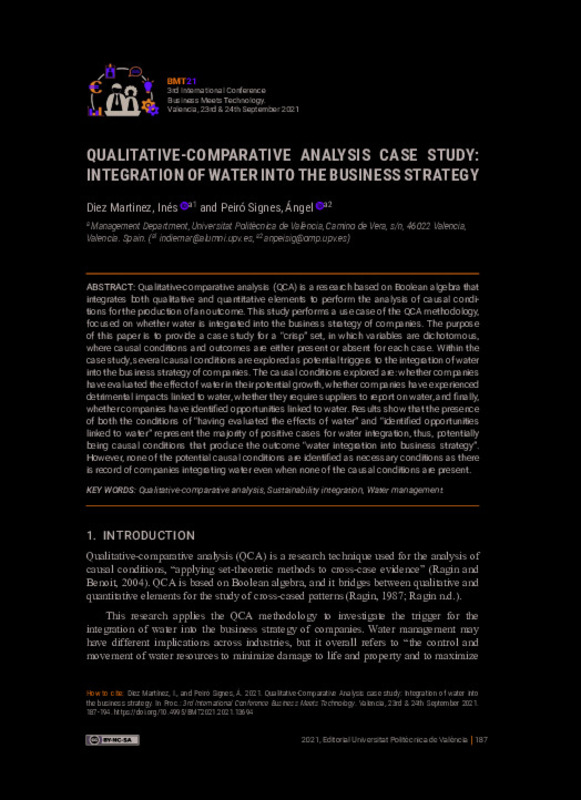JavaScript is disabled for your browser. Some features of this site may not work without it.
Buscar en RiuNet
Listar
Mi cuenta
Estadísticas
Ayuda RiuNet
Admin. UPV
Qualitative-Comparative Analysis case study: Integration of water into the business strategy
Mostrar el registro sencillo del ítem
Ficheros en el ítem
| dc.contributor.author | Díez Martínez, Inés
|
es_ES |
| dc.contributor.author | Peiró Signes, Ángel
|
es_ES |
| dc.date.accessioned | 2022-10-13T07:01:16Z | |
| dc.date.available | 2022-10-13T07:01:16Z | |
| dc.date.issued | 2022-02-21 | |
| dc.identifier.isbn | 9788490484173 | |
| dc.identifier.uri | http://hdl.handle.net/10251/187556 | |
| dc.description.abstract | [EN] Qualitative-comparative analysis (QCA) is a research based on Boolean algebra that integrates both qualitative and quantitative elements to perform the analysis of causal conditions for the production of an outcome. This study performs a use case of the QCA methodology, focused on whether water is integrated into the business strategy of companies. The purpose of this paper is to provide a case study for a “crisp” set, in which variables are dichotomous, where causal conditions and outcomes are either present ot absent for each case. Within the case study, several causal conditions are explored as potential triggers to the integration of water into the business strategy of companies. The causal conditions explored are: whether companies have evaluated the effect of water in their potential growth, whether companies have experienced detrimental impacts linked to water, whether they require suppliers to report on water, and finally, whether companies have identified opportunities linked to water. Results show that the presence of both the conditions of “having evaluated the effects of water” and “identified opportunities linekd to water” represent 72.7% of the positive cases for water integration, thus, potentially being causal conditions that produce the outcome “water integration into business strategy”. However, none of the potential causal conditions are identified as necessary conditions as there is record of companies integrating water even when none of the causal conditions are present. | es_ES |
| dc.format.extent | 8 | es_ES |
| dc.language | Inglés | es_ES |
| dc.publisher | Editorial Universitat Politècnica de València | es_ES |
| dc.relation.ispartof | Proceedings 3rd International Conference. Business Meets Technology | |
| dc.rights | Reconocimiento - No comercial - Compartir igual (by-nc-sa) | es_ES |
| dc.subject | Qualitative-comparative analysis | es_ES |
| dc.subject | Water integration | es_ES |
| dc.subject | Causal conditions analysis | es_ES |
| dc.subject | Sustainability integration | es_ES |
| dc.subject | Water management | es_ES |
| dc.title | Qualitative-Comparative Analysis case study: Integration of water into the business strategy | es_ES |
| dc.type | Capítulo de libro | es_ES |
| dc.type | Comunicación en congreso | es_ES |
| dc.identifier.doi | 10.4995/BMT2021.2021.13694 | |
| dc.rights.accessRights | Abierto | es_ES |
| dc.contributor.affiliation | Universitat Politècnica de València. Facultad de Administración y Dirección de Empresas - Facultat d'Administració i Direcció d'Empreses | es_ES |
| dc.contributor.affiliation | Universitat Politècnica de València. Departamento de Organización de Empresas - Departament d'Organització d'Empreses | es_ES |
| dc.description.bibliographicCitation | Díez Martínez, I.; Peiró Signes, Á. (2022). Qualitative-Comparative Analysis case study: Integration of water into the business strategy. En Proceedings 3rd International Conference. Business Meets Technology. Editorial Universitat Politècnica de València. 187-194. https://doi.org/10.4995/BMT2021.2021.13694 | es_ES |
| dc.description.accrualMethod | OCS | es_ES |
| dc.relation.conferencename | 3rd International Conference. Business Meets Technology | es_ES |
| dc.relation.conferencedate | Septiembre 23-24, 2021 | es_ES |
| dc.relation.conferenceplace | Valencia, España | es_ES |
| dc.relation.publisherversion | http://ocs.editorial.upv.es/index.php/BMT/BMT2021/paper/view/13694 | es_ES |
| dc.description.upvformatpinicio | 187 | es_ES |
| dc.description.upvformatpfin | 194 | es_ES |
| dc.type.version | info:eu-repo/semantics/publishedVersion | es_ES |
| dc.relation.pasarela | OCS\13694 | es_ES |








